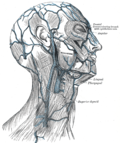Retromandibular vein: Difference between revisions
CSV import Tags: mobile edit mobile web edit |
CSV import |
||
| Line 31: | Line 31: | ||
{{stub}} | {{stub}} | ||
<gallery> | |||
File:Gray557.png|Gray's Anatomy illustration of the retromandibular vein | |||
File:Gray1024.png|Gray's Anatomy illustration of the veins of the face and scalp | |||
File:Lateral_head_anatomy_detail.jpg|Lateral view of head anatomy detail | |||
</gallery> | |||
Latest revision as of 21:04, 23 February 2025
Retromandibular vein is a vein located within the parotid gland in the human body. It is formed by the union of the superficial temporal vein and maxillary vein. The retromandibular vein divides into two branches: anterior and posterior. The anterior branch joins with the facial vein to form the common facial vein, while the posterior branch joins with the posterior auricular vein to form the external jugular vein.
Structure[edit]
The retromandibular vein is formed within the substance of the parotid gland by the union of the maxillary vein and superficial temporal vein. It descends in the substance of the gland, and divides into two branches: anterior and posterior.
Anterior Branch[edit]
The anterior branch of the retromandibular vein exits the gland and joins with the facial vein to form the common facial vein, which drains into the internal jugular vein.
Posterior Branch[edit]
The posterior branch of the retromandibular vein exits the gland and joins with the posterior auricular vein to form the external jugular vein.
Function[edit]
The retromandibular vein plays a crucial role in draining blood from parts of the face and scalp. It is a significant component of the venous system of the head and neck.
Clinical Significance[edit]
Due to its location within the parotid gland, the retromandibular vein may be affected by parotid gland diseases such as parotitis and parotid gland tumors. Its proximity to the facial nerve also makes it susceptible to injury during surgical procedures involving the parotid gland.





